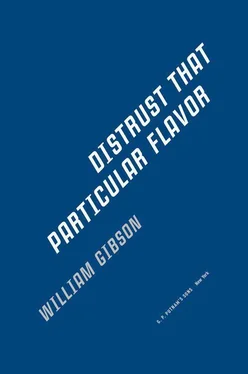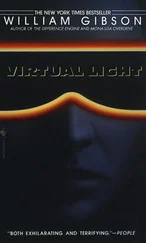So I wrote a novel called Virtual Light , which was set in 2006, which was then the very near future, and followed it with two more novels, each set a few imaginary years later, in what was really my take on the 1990s. It didn’t seem to make any difference. Lots of people assumed I was still writing about the capital-F future. I began to tell interviewers, somewhat testily, that I believed I could write a novel set in the present, our present, then, which would have exactly the affect of my supposed imaginary futures. Hadn’t J. G. Ballard declared Earth to be the real alien planet? Wasn’t the future now?
SO I DID. In 2001, I was writing a book that became Pattern Recognition , my seventh novel, though it only did so after 9-11, which I’m fairly certain will be the real start of every documentary ever to be made about the present century. I found the material of the actual twenty-first century richer, stranger, more multiplex, than any imaginary twenty-first century could ever have been. And it could be unpacked with the toolkit of science fiction. I don’t really see how it can be unpacked otherwise, as so much of it is so utterly akin to science fiction, complete with a workaday level of cognitive dissonance we now take utterly for granted.
Zero History , my ninth novel, will be published this September, rounding out that third set of three books. It’s set in London and Paris, last year, in the wake of global financial collapse.
I wish that I could tell you what it’s about, but I haven’t yet discovered my best likely story, about that. That will come with reviews, audience and bookseller feedback (and booksellers are especially helpful, in that way). Along with however many interviews, these things will serve as a sort of oracle, suggesting to me what it is I’ve been doing for the past couple of years.
If Pattern Recognition was about the immediate psychic aftermath of 9-11, and Spook Country about the deep end of the Bush administration and the invasion of Iraq, I could say that Zero History is about the global financial crisis as some sort of nodal event, but that must be true of any 2010 novel with ambitions on the 2010 zeitgeist. But all three of these novels are also about that dawning recognition that the future, be it capital-T Tomorrow or just tomorrow, Friday, just means more stuff, however peculiar and unexpected. A new quotidian. Somebody’s future, somebody else’s past.
Simply in terms of ingredients, it’s about recent trends in the evolution of the psychology of luxury goods, crooked former Special Forces officers, corrupt military contractors, the wonderfully bizarre symbiotic relationship between designers of high-end snowboarding gear and manufacturers of military clothing, and the increasingly virtual nature of the global market.
I called it Zero History because one of the characters has had a missing decade, during which he paid no taxes and had no credit cards. He meets a federal agent, who tells him that that combination indicates to her that he hasn’t been up to much good, the past ten years. But that quotidian now finds him. Events find him, and he starts to acquire a history. And, one assumes, a credit rating, and the need to pay taxes.
It’s also the first book I’ve written in which anyone gets engaged to be married.
A book exists at the intersection of the author’s subconscious and the reader’s response. An author’s career exists in the same way. A writer worries away at a jumble of thoughts, building them into a device that communicates, but the writer doesn’t know what’s been communicated until it’s possible to see it communicated.
After thirty years, a writer looks back and sees a career of a certain shape, utterly unanticipated.
It’s a mysterious business, the writing of fiction, and I thank you all for making it possible.

This was given (that is, read aloud with some minimal attempts at appropriate body language) at a box lunch event for booksellers at Book Expo, which used to be called the ABA, for American Booksellers Association, whose oceanic trade fair it is. It’s a daunting experience for an author, Book Expo, if only in sheer scale of numbers. You’ve never seen so many new books, and one’s own title the merest raindrop in that sea.
Sorry for the Zero History pitch toward the end, but I had my marching orders.


TIME MOVES IN ONE DIRECTION, memory in another.
We are that strange species that constructs artifacts intended to counter the natural flow of forgetting.
I sometimes think that nothing really is new; that the first pixels were particles of ocher clay, the bison rendered in just the resolution required. The bison still function perfectly, all these millennia later, and what screen in the world today shall we say that of in a decade? And yet the bison will be there for us, on whatever screens we have, carried out of the primal dark on some impulse we each have felt, as children, drawing. But carried nonetheless on this thing we have always been creating, this vast unlikely mechanism that carries memory in its interstices; this global, communal, prosthetic memory that we have been building since before we learned to build.
We live in, have lived through, a strange time. I know this because when I was a child, the flow of forgetting was relatively unimpeded. I know this because the dead were less of a constant presence, then. Because there was once no Rewind button. Because the soldiers dying in the Somme were black and white, and did not run as the living run. Because the world’s attic was still untidy. Because there were old men in the mountain valleys of my Virginia childhood who remembered a time before recorded music.
When we turn on the radio in a New York hotel room and hear Elvis singing “Heartbreak Hotel,” we are seldom struck by the peculiarity of our situation: that a dead man sings.
In the context of the longer life of the species, it is something that only just changed a moment ago. It is something new, and I sometimes feel that, yes, everything has changed. (This perpetual toggling between nothing being new, under the sun, and everything having very recently changed, absolutely, is perhaps the central driving tension of my work.)
Our “now” has become at once more unforgivingly brief and unprecedentedly elastic. The half-life of media product grows shorter still, till it threatens to vanish altogether, everything into some weird quantum logic of its own, the Warholian Fifteen Minutes becoming a quarklike blink. Yet once admitted to the culture’s consensus pantheon, certain things seem destined to be with us for a very long time indeed. This is a function, in large part, of the Rewind button. And we would all of us, to some extent, wish to be in heavy rotation.
And as this capacity for recall (and recommodification) grows more universal, history itself is seen to be even more obviously a construct, subject to revision. If it has been our business, as a species, to dam the flow of time through the creation and maintenance of mechanisms of external memory, what will we become when all these mechanisms, as they now seem intended ultimately to do, merge?
Читать дальше












